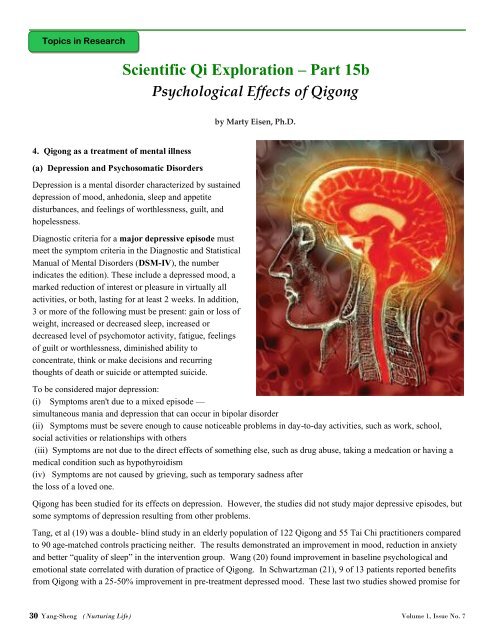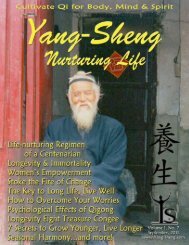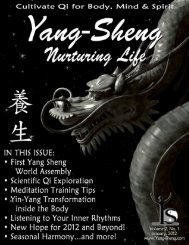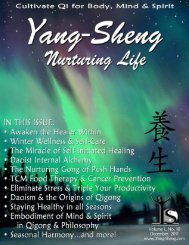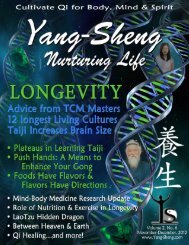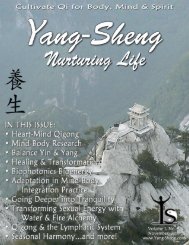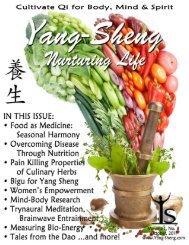Click to download the entire September issue as a PDF - Yang-Sheng
Click to download the entire September issue as a PDF - Yang-Sheng
Click to download the entire September issue as a PDF - Yang-Sheng
You also want an ePaper? Increase the reach of your titles
YUMPU automatically turns print PDFs into web optimized ePapers that Google loves.
Topics in Research<br />
Scientific Qi Exploration – Part 15b<br />
Psychological Effects of Qigong<br />
by Marty Eisen, Ph.D.<br />
4. Qigong <strong>as</strong> a treatment of mental illness<br />
(a) Depression and Psychosomatic Disorders<br />
Depression is a mental disorder characterized by sustained<br />
depression of mood, anhedonia, sleep and appetite<br />
disturbances, and feelings of worthlessness, guilt, and<br />
hopelessness.<br />
Diagnostic criteria for a major depressive episode must<br />
meet <strong>the</strong> symp<strong>to</strong>m criteria in <strong>the</strong> Diagnostic and Statistical<br />
Manual of Mental Disorders (DSM-IV), <strong>the</strong> number<br />
indicates <strong>the</strong> edition). These include a depressed mood, a<br />
marked reduction of interest or ple<strong>as</strong>ure in virtually all<br />
activities, or both, l<strong>as</strong>ting for at le<strong>as</strong>t 2 weeks. In addition,<br />
3 or more of <strong>the</strong> following must be present: gain or loss of<br />
weight, incre<strong>as</strong>ed or decre<strong>as</strong>ed sleep, incre<strong>as</strong>ed or<br />
decre<strong>as</strong>ed level of psychomo<strong>to</strong>r activity, fatigue, feelings<br />
of guilt or worthlessness, diminished ability <strong>to</strong><br />
concentrate, think or make decisions and recurring<br />
thoughts of death or suicide or attempted suicide.<br />
To be considered major depression:<br />
(i) Symp<strong>to</strong>ms aren't due <strong>to</strong> a mixed episode —<br />
simultaneous mania and depression that can occur in bipolar disorder<br />
(ii) Symp<strong>to</strong>ms must be severe enough <strong>to</strong> cause noticeable problems in day-<strong>to</strong>-day activities, such <strong>as</strong> work, school,<br />
social activities or relationships with o<strong>the</strong>rs<br />
(iii) Symp<strong>to</strong>ms are not due <strong>to</strong> <strong>the</strong> direct effects of something else, such <strong>as</strong> drug abuse, taking a medcation or having a<br />
medical condition such <strong>as</strong> hypothyroidism<br />
(iv) Symp<strong>to</strong>ms are not caused by grieving, such <strong>as</strong> temporary sadness after<br />
<strong>the</strong> loss of a loved one.<br />
Qigong h<strong>as</strong> been studied for its effects on depression. However, <strong>the</strong> studies did not study major depressive episodes, but<br />
some symp<strong>to</strong>ms of depression resulting from o<strong>the</strong>r problems.<br />
Tang, et al (19) w<strong>as</strong> a double- blind study in an elderly population of 122 Qigong and 55 Tai Chi practitioners compared<br />
<strong>to</strong> 90 age-matched controls practicing nei<strong>the</strong>r. The results demonstrated an improvement in mood, reduction in anxiety<br />
and better ―quality of sleep‖ in <strong>the</strong> intervention group. Wang (20) found improvement in b<strong>as</strong>eline psychological and<br />
emotional state correlated with duration of practice of Qigong. In Schwartzman (21), 9 of 13 patients reported benefits<br />
from Qigong with a 25-50% improvement in pre-treatment depressed mood. These l<strong>as</strong>t two studies showed promise for<br />
30 <strong>Yang</strong>-<strong>Sheng</strong> (Nurturing Life) Volume 1, Issue No. 7


